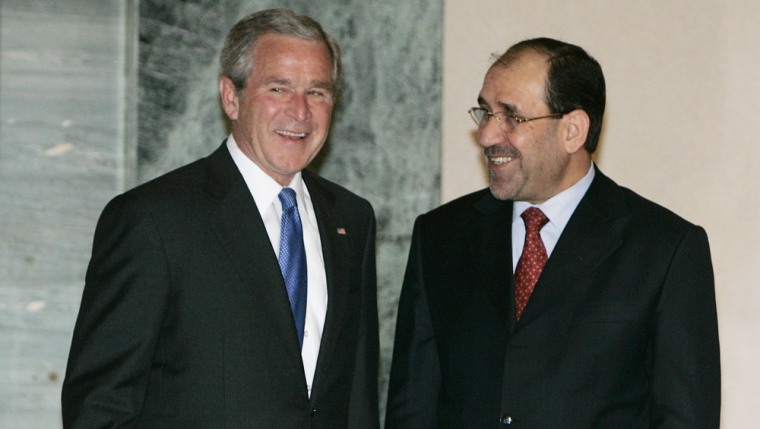President Bush’s trip to Baghdad comes at a pivotal time for the new prime minister, as he tries to convince Iraqis the country can stand on its own and end violence — if they unite behind him.
But instead of bolstering that effort, Bush’s trip could push away the very Sunni Arabs Prime Minister Nouri al-Maliki is trying to court.
Bush and U.S. Ambassador Zalmay Khalilzad have made much of the fact that al-Maliki and his national unity government are the result of three years of democratic progress. But it is an experiment in Middle Eastern civics that has cost thousands of American and Iraqi lives and arguably has been outpaced by the Sunni insurgency.
“I appreciate you recognizing that the future of the country is in your hands,” Bush told al-Maliki as he came to Baghdad to congratulate the prime minister for finally assembling a Cabinet six months after parliamentary elections.
He lauded al-Maliki for bringing together Shiites, Sunni Arabs, Kurds and Christians in a government he hopes will convince insurgents of its impartiality.
“You’ve assembled people from all parts of your country, representing different religions, different histories and traditions. And yet the Cabinet here represents the entire Iraqi people,” Bush said.
Cabinet comprised of second, third choices
But many Iraqis are already wary of the Cabinet — assembled from second and third choices to overcome sectarian objections and bearing fingerprints of the Bush administration.
Khalilzad has often commented about the active role he played in the negotiations to form the government; many of those talks took place inside his residence.
“Bush does need to reinforce Khalilzad’s efforts to produce stable political compromises, include the Sunnis, talk to the ‘moderate’ insurgents and prepare to appoint an inclusive body to review the constitution. U.S. pressure to reach a stable compromise between factions is critical,” said Anthony Cordesman, an analyst at the Washington-based Center for Strategic and International Studies.
Al-Maliki’s political future may be bleak if he fails to convince Sunni Arabs he is not a Washington puppet and truly wants to disarm Shiite militias and death squads blamed for hundreds of killings.
Many Sunni Arab and even some Shiite political parties dismissed the visit as an attempt by Bush to associate himself with positive developments in Iraq — formation of the new government and last week’s killing of al-Qaida in Iraq leader Abu Musab al-Zarqawi. Bush’s political standing portends a difficult election for fellow Republicans in November’s congressional elections.
“This visit carries a lot of meanings, but this visit means nothing to the Iraqi street. There will never be any benefits from such a visit and the only one to benefit from this visit is Bush himself and his troops here, not the Iraqi people,” said Hassan al-Robaie, a lawmaker loyal to anti-American Shiite cleric Muqtada al-Sadr.
Baghdad University political science professor Nabil Mohammed Selim said Bush’s trip also was a bid to show the world that he has achieved something in Iraq.
“In fact, nothing has been achieved in Iraq, hundreds of innocent Iraqis are being killed daily because of the chaos,” Selim said.
Failures and successes
On June 28, Iraq celebrates two years since the restoration of its sovereignty. In that time it has seen some success: three governments, two elections and a referendum on a constitution.
It has also seen a catastrophic failure to restore security and, more importantly, move the country away from sectarian killing and forced relocations that threaten to divide Iraq.
In Baghdad, dozens of people are blown up, shot or beheaded by sectarian gangs every day. Islamic extremists attack liquor stores, order women not to drive and shoot men for wearing shorts.
The city of 6 million has become so dangerous that al-Maliki plans to restore security by flooding its streets with 75,000 Iraqi and American troops.
Some Sunnis think the success of the Bush visit can only be gauged on al-Maliki’s ability to persuade the U.S. president to start pulling some of the 130,000 American troops from the country.
“We hope that al-Maliki persuades Bush to announce a timetable for the withdrawal of U.S. forces, otherwise the visit is of no relevance to Iraqis,” said Zafer al-Ani, spokesman for the Iraqi Accordance Front — the main Sunni Arab partner in al-Maliki’s government.
